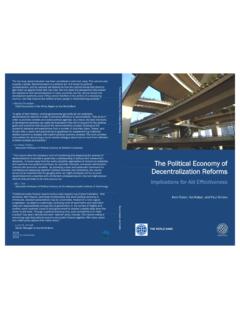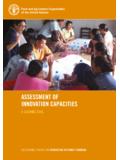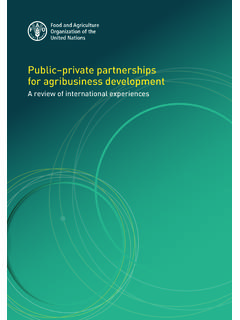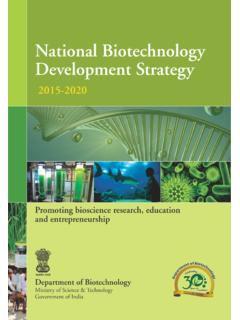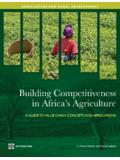Transcription of Developing Entrepreneurs through an …
1 SYNOPSISThe Agri-Business Incubation (ABI) Program atICRISAT, launched in 2003, is an initiative of theInternational Crops Research Institute for theSemi-Arid Tropics (ICRISAT) in partnership with India sDepartment of Science and Technology (DST). ABI pro-motes agricultural technologies developed by ICRISAT,other R&D centers of excellence, universities, and otherinstitutions, separately and jointly. Its approach features adual service and outreach strategy. The service strategyfocuses business development on five strategic areas, build-ing on the expertise of ICRISAT and its partners: seed, bio-fuels, ventures to develop particular innovations (productsor services), farming (high-value crops), and agriculturalbiotechnology. The outreach strategy involves collaborativebusiness incubation to bring a wider range of expertise andresources to bear on business development to foster agricul-tural development in other regions.
2 CONTEXT: INCUBATORS IN INDIA ANDAGRIBUSINESSB usiness incubators are gaining a foothold in India. A recentsurvey found that their numbers had grown from 10 in 2000to 30 business incubators and science and technology parksinvolved in the commercialization of software and otherengineering technologies in 2009 (NSTEDB and ISBA2009). Of the 495 ventures that graduated from the businessincubators in India, 387 remained in business. More than10,000 jobs were created through these ventures. Theseincubators have stakeholders in government agencies,financial institutions, and venture capital operations. Onlythree were involved in agribusiness in 2008, although vari-ous government departments, which recently created entre-preneurship promotion programs, have expressed an inter-est in establishing agribusiness incubators can take the form of comprehen-sive occupational schools, offering rural producers andworkers sufficient knowledge, experience, infrastructure, andmeans to become agribusiness Entrepreneurs .
3 This endoge-nous movement can have far-reaching effects, promoting theoverall modernization of primary production, industrializa-tion, and marketing and development of rural areas. More specifically, however, an agribusiness incubator cre-ates a mechanism to assist in the identification, adaptation,and commercialization of products from public and privateagricultural research institutions and universities. From adevelopment perspective, the goal of agribusiness incubationprograms is to develop and commercialize new products,technologies, and services to improve productivity in farmers fields and increase the practical impact of researchconducted in India s academic and research provide a means of leveraging the significantresources invested in R&D and infrastructure, generatingemployment and income in India s rural areas, and ulti-mately creating wealth to support the livelihoods of the INCUBATION PROGRAMOBJECTIVE AND DESCRIPTIONThe Agri-Business Incubation (ABI) program, launched in2003, is an initiative of the International Crops ResearchInstitute for the Semi-Arid Tropics (ICRISAT) in partner-ship with the Department of Science and Technology(DST)
4 , Government of India. ABI promotes agriculturaltechnologies developed by ICRISAT, other R&D centers ofexcellence, universities, and other institutions, separatelyand jointly. The incubator was set up as part of ICRISAT sAgri Science Park (later the agribusiness and InnovationPlatform). ABI is governed by a board of advisors headed bythe Director General of ICRISAT and by a standing advisorycommittee that counsels the board on strategy and clientintake and exit. 421 Developing Entrepreneurs through an agribusiness Incubator at ICRISATK iran K. Sharma, International Crops Research Institute for the Semi-Arid Tropics (ICRISAT) Karuppanchetty, ICRISATS. Aravazhi, ICRISATINNOVATIVE ACTIVITY PROFILE 1 ABI represents a new resource to promote enterprisedevelopment in agriculture and facilitate business amongentrepreneurs and technology developers.
5 The pillars forhigh-performance incubation are R&D, business planning,business development, and access to capital (figure ). Theframework encompasses all the services and support sys-tems offered to an agribusiness venture, such as technologytransfer, business facilitation, and technical guidance, espe-cially those in ABI s focal areas of seed, biofuel, and farmsystems. ABI also facilitates the commercialization of ser-vices that benefit ELEMENTABI is the only incubator with an inclusive, market-orienteddevelopment plan that seeks to improve farmers livelihoodsthrough business incubation. Based on the experiencegained in the years since ABI s inception, the approach hasevolved to benefit the farmers through a vertical strategy(service strategy) and a horizontal strategy (an outreachstrategybased on partnerships in collaborative businessincubation).
6 The service strategyfocuses development on strategicareas related to the mandates of ICRISAT and its partners: Seed Entrepreneurs receive support indeveloping a seed business to meet the demand for high-quality seed of open-pollinated crops. through partner-ing with public and private entities, Entrepreneurs areassisted in seed production, processing, and marketing(box ). Biofuel promotes industries involved inproducing ethanol from sweet sorghum and other agri-cultural materials. Innovative agribusiness venturesare based on proprietary products or novel services withgood market potential. Farm farming, organic farming, andprecision farming are among the commercial farmingventures promoted through ABI. Agribiotech enables seed companies toengage in the emerging area of agricultural biotechnol-ogy by Developing genetic transformation protocols forcommercial crops, molecular markers for traits of inter-est for seed producers, and tissue culture methods forproducing medicinal, horticultural, and tree outreach strategyof ABI is to collaborate withorganizations globally in business incubation (cobusiness422 AGRICULTURAL INNOVATION SYSTEMS.)
7 AN INVESTMENT SOURCEBOOKF igure Framework for Business Incubation in ABIB usiness planningCapitalizationAccess to R&D networksProduct developmentbest practicesAccess to servicesValue propositiondevelopmentExchange of ideasChampionsNetworks andalliancesAccess to capitalIP identification andprotection strategiesR & DSales and distributionchannel strategiesStrategyDevelopmentState-of-th e-artmarketing best practicesSpecialized facilitiesBusiness developmentHigh-performanceincubationSou rce:ABI Strategic Business Plan 2008 ). The benefits of cobusiness incubation are thatit provides enhanced support and services to a greater num-ber of Entrepreneurs ; enables complementary business andtechnology development in a greater number of regions;fosters cross-border ventures and business development;provides access to a greater range of physical, technical, andother facilities for clients; improves access to a greater rangeof markets; offers common branding that can make clients businesses more marketable; and maintains an inclusive,market-oriented development strategy.
8 Cobusiness incubation services with other institutionalpartners include: planning, development, and implemen-tation of a business incubator; facilitating coordinationand operations; capacity building in business incubationoperations; business consultancy support services; accessby Technology Development Board Entrepreneurs to seedcapital; development and implementation of incubationservices in the focal areas (seed, agricultural biotechnol-ogy, biofuel, other innovation, farms, and potentiallyother areas); and making the system successful and self-sustaining through M&E. To date, key partners forcobusiness incubation have come from the Network ofIndian Agri-Business Incubators (NIABI) and is the coordinating body for NIABI,which is implemented by ICAR under the World Bank-funded NAIP 5: INNOVATIVE ACTIVITY PROFILE 1: Developing Entrepreneurs through AN agribusiness INCUBATOR423 Box Aakruthi Agricultural Associates: An Incubator GraduateAakruthi Agricultural Associates of India (AAI) waslaunched in 2004 as a commercial alternative to gov-ernment agricultural extension services in AnantapurProvince of Andhra Pradesh.
9 AAI joined forces withAgri-Business Incubation (ABI) in 2005 and in 2006became the second venture to graduate from the incubator. through the incubator, AAI developed a successfulbusiness model based on partnership with seedproviders like ICRISAT, national and state agriculturalresearch centers, and farmer franchisees. AAI designedreplicable seed business ventures and proprietarymethods for recruiting farmer Entrepreneurs for local,low-cost, high-productivity seed multiplication. Theseventures create seed delivery systems that offer an alter-native to government-supported channels and allowmore rapid introduction of superior varieties. AAI hasbuilt a network of 70 farmer Entrepreneurs in AndhraPradesh. These Entrepreneurs pay franchise fees andreceive working capital advances. They engage morethan 300 farmers in seed multiplication and currentlyhave 4,000 acres under production.
10 The target crops include groundnuts, chickpeas,pigeonpeas, and rice. Oil and legume seeds, in partic-ular, offer limited commercial opportunity for multi-plication and distribution due to their inherent lowmultiplication ratios. through its franchise concept,AAI can sell seed of these crops in markets wheredemand significantly exceeds supply. Demand forgroundnut seed in Anantapur, for example, exceedssupply by 80 percent. The gap for chickpeas is 30 per-cent; for pigeonpeas, 70 percent. When AAI graduated from the incubator in 2006, itbecame a full business partner with ICRISAT for dis-tributing ICRISAT seed in Andhra Pradesh. AAI hascompressed the time between the release of new seedand market acceptance in Andhra Pradesh from eightyears to less than three years. The advantage of morerapid market penetration is significant for bothICRISAT and farmers.




